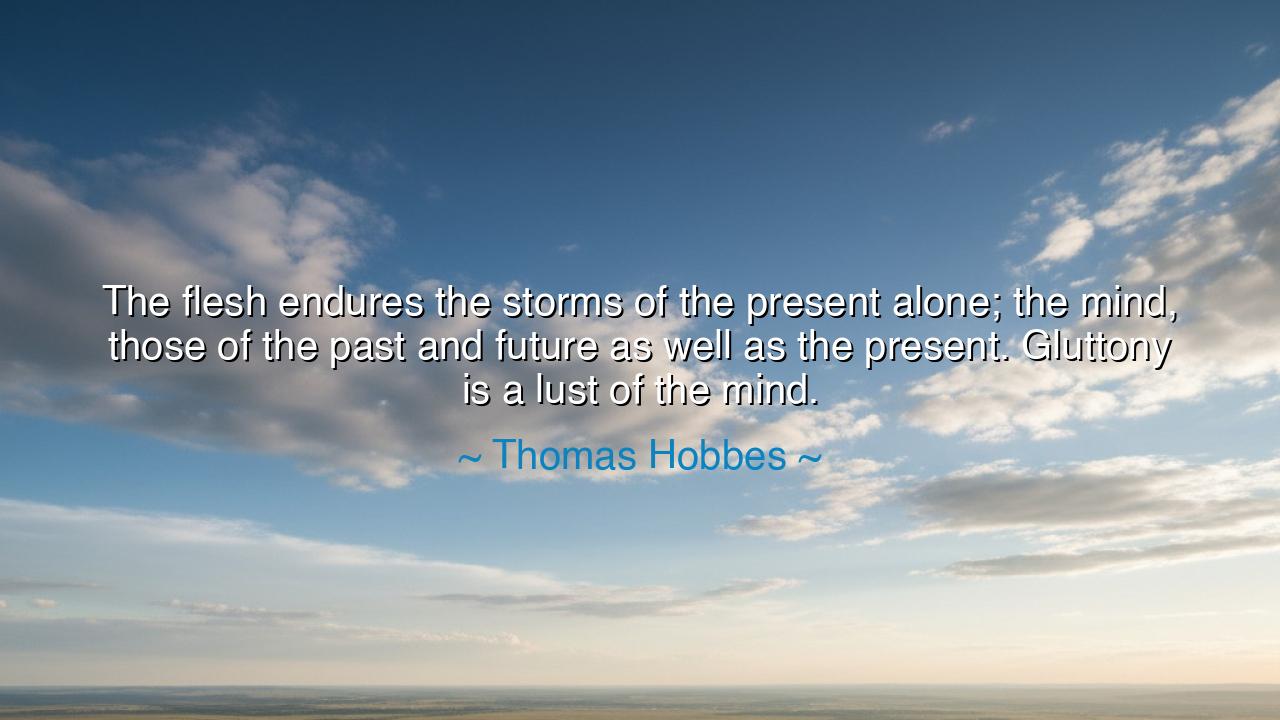
The flesh endures the storms of the present alone; the mind
The flesh endures the storms of the present alone; the mind, those of the past and future as well as the present. Gluttony is a lust of the mind.






"The flesh endures the storms of the present alone; the mind, those of the past and future as well as the present. Gluttony is a lust of the mind." These words from Thomas Hobbes carry a deep, introspective understanding of the nature of human suffering, the workings of the body and mind, and the consequences of unchecked desires. Hobbes' insight reveals the distinction between the physical and the mental burdens we carry. The flesh, or body, can only bear the trials and difficulties of the present moment, the weight of current struggles, pains, and physical demands. But it is the mind—the seat of our thoughts—that is tasked with enduring not only the present but also the past and the future, those realms that haunt our thoughts and weigh down our spirits.
The body experiences its own form of suffering: exhaustion, pain, and physical conflict—all of which are tied to the immediate, to the here and now. Yet, the mind, in its infinite capacity for reflection and imagination, stretches beyond the present moment, often carrying the burdens of the past—regrets, failures, and memories—and the future—anxieties, fears, and hopes. The body can heal from the wounds of the present, but the mind, if unguarded, continues to suffer from wounds that are self-inflicted by dwelling in the past or worrying about an uncertain future. This reveals the unique torment of the human experience: while the flesh is bound to the limitations of the present, the mind is capable of extending its suffering across time, often compounding the pain of the current moment with the weight of what was and the fear of what might be.
Consider the story of Achilles, the great warrior of the Iliad, whose body endures countless battle wounds, yet it is his mind that suffers the deepest torment. Achilles is a man of immense physical prowess, but his pride, rage, and grief over the death of his beloved friend Patroclus torment his soul far more than any weapon could wound his body. His mental anguish over his past choices and his fear of an uncertain future drive him to make decisions that ultimately seal his fate. In this way, Achilles embodies Hobbes' idea that while the flesh may bear the immediate wounds of war, it is the mind that carries the far more profound suffering—memories of the past and fears for what lies ahead.
In the same way, we see this in the lives of countless figures throughout history, such as Napoleon Bonaparte, whose ambition and military brilliance were matched only by his inner demons. While his body endured the rigors of battle, it was his mind that was his true battlefield—haunted by the losses of his empire and the weight of history. As he was exiled to the island of Saint Helena, it was not his physical suffering that consumed him, but the relentless mental burden of his past actions, the regrets of what could have been, and the uncertainty of how he would be remembered. His body may have been confined to a small island, but his mind was bound by the vast reaches of his past and future, never able to escape the self-inflicted suffering he carried within.
Hobbes’ mention of gluttony—"a lust of the mind"—points to the deeper, more insidious nature of our desires. We often think of gluttony as a physical indulgence, a craving for food or drink. Yet, Hobbes transforms this notion into a mental craving, where the mind itself becomes greedy—yearning for things that are not present, dwelling on past pleasures or sorrows, and anxiously grasping at an unknown future. This mental gluttony leads to a never-ending cycle of desire and discontent, where the mind constantly feasts on thoughts, regrets, and worries, never finding satisfaction or peace.
In a more personal sense, we can observe this in the lives of individuals who suffer from anxiety, depression, or regret. The mind, like a glutton, consumes thoughts of past mistakes, missed opportunities, and unfulfilled desires, often to the detriment of their present lives. The cycle of overthinking and rumination creates a mental gluttony that is insatiable, where the mind cannot break free from the constant need for validation, reassurance, or closure. The suffering, as Hobbes suggests, is not the result of what is happening in the present, but of what we choose to dwell on—the past that cannot be changed, and the future that cannot be controlled.
The lesson from Hobbes’ words is one of awareness and self-discipline. The mind is a powerful force, but it can also be a prison if left unchecked. We must learn to live in the present, to recognize when our mental cravings are leading us away from peace and contentment. In practical terms, this means that when we find ourselves consumed by past regrets or future anxieties, we must redirect our focus to the present moment—to what we can control and what is within our reach. Mindfulness, meditation, and self-reflection can help us break free from the endless loop of mental gluttony, allowing us to find peace within ourselves, no matter the struggles we may face in the physical world.
Hobbes’ wisdom calls us to realize that true strength comes not from the body but from the mind—and in mastering our thoughts, we can overcome the suffering that often arises from the past and the future. Just as Achilles and Napoleon learned, the mind can be both a source of great strength and great torment, and it is our responsibility to nourish it wisely, focusing on the present and finding peace in what is rather than what was or what might be.






AAdministratorAdministrator
Welcome, honored guests. Please leave a comment, we will respond soon